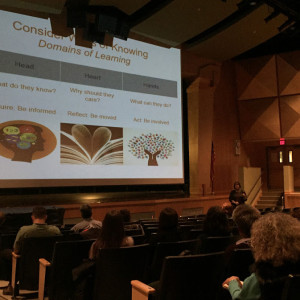Decades of research show that when families and schools partner together, children are better positioned to reach their greatest potential as learners and active members of the school community. There’s simply no doubt that parental involvement is directly linked to students with higher self-confidence and more positive attitudes toward school and learning. From better attendance and higher grades, to better homework completion rates and higher graduation rates, the most consistent predictor of high academic achievement and positive social adjustment for children is engaged parents.
When I collaborate with school staff and parents, I highlight the fundamental belief that all teachers and families want to work collaboratively to support the development of every child. Perhaps they simply lack sufficient skill to do so effortlessly. However, when skills are nurtured, a true partnership allows us to advance the eager reader and the math whiz beyond grade level, develop a child’s ability to organize and plan work effectively, strengthen language skills, and nurture social-emotional development—all critical outcomes of the early education years. With a team approach, we are better able to understand how every child thinks and learns, capitalizing on his or her strengths and working together to support any challenges that may impact learning.
Here are some tips for focusing on partnership…
The Commitment to Parents-As-Partners–What Schools Can Do
Walk the talk. It isn’t enough to say the partnership is important. A true commitment is evident when parents are invited into the school for a variety of child-specific as well as social events and activities.
Our information is your information. When a teacher makes observations or has assessment data about a child, parents are urged to contribute to the plan for education. Whether a child needs to be more challenged or his learning more supported, teachers engage parents in the conversation.
Be Flexible. Schools must demonstrate respect for the real work-family balance issues parents struggle with. Creating family-friendly ways for engagement should be a school-wide priority.
Build a Community of Learners. Schools are uniquely positioned to encourage parents to be lifelong learners. Through parent education, family support, and referral services, schools play a key role in helping parents see the benefit of growing and developing as their child’s best teacher.
Tips for Strengthening the Partnership–What Parents Can Do
Make connections early. There’s no telling when there will be a need to discuss a child’s academic, social-emotional, or behavioral learning. It’s always easier to be open and honest when a relationship has already been established.
Opt for face-to-face communication. Voice mail and email, while time-efficient, may lead to incomplete or contentious communication. Talking to teachers about your child is more likely to be successful when the communication is done in person and has been scheduled so both parent and teacher have had time to think through the main objectives.
Always keep your child at the center of your exchanges. Not every parent and teacher will have an affinity for each other. Yet when parents and teachers keep the child in front, and not between them, the child is sure to benefit.
